In 2004 Manyara Mutekani, a community activist, initiated the God Knows project in her rural community Maori village in Mashonaland Central province. God Knows provided support to 80 vulnerable children and youth (and their caregivers) living in Maori and five nearby villages.
God Knows already had Canadian well-wishers. Carol McKey, owner of Milkweed Preschool in Peterborough, Ontario, initiated a Children Helping Children project in 2008 after meeting and talking to Dr. Paul Thistle on one of his fundraising trips to Canada. This wonderful grassroots initiative involved the children in Zimbabwe and the children in Canada, who produced art work which is screened onto T-shirts, laptop bags and other products. All net proceeds from sales went to God Knows to cover school fees, uniforms and educational resources. The children regularly sent letters and pictures to each other.
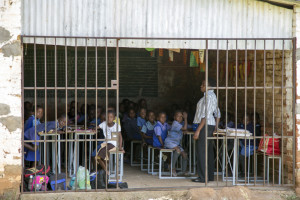 In January 2011, Fran Fearnley (owner of ZimArt, a Canadian gallery specializing in Zimbabwean stone sculpture) went to Maori Village to deliver letters, pictures and money raised by Milkweed Preschool. There she met with Manyara Mutekani, who was also chair of the local school development committee, representing 134 families and 350 primary school children. All of these children attended school in a ‘satellite facility’ – a cluster of old, abandoned, structurally unsound farm buildings with leaking roofs and homemade windows, which made for a very challenging (and unsafe) learning environment for both students and teachers.
In January 2011, Fran Fearnley (owner of ZimArt, a Canadian gallery specializing in Zimbabwean stone sculpture) went to Maori Village to deliver letters, pictures and money raised by Milkweed Preschool. There she met with Manyara Mutekani, who was also chair of the local school development committee, representing 134 families and 350 primary school children. All of these children attended school in a ‘satellite facility’ – a cluster of old, abandoned, structurally unsound farm buildings with leaking roofs and homemade windows, which made for a very challenging (and unsafe) learning environment for both students and teachers.
Most of the families in the area are small-scale farmers. The community was and is united in its desire to have all their children attend school in an adequate facility. The closest primary school is 11 km away, too far for these young children to walk to and from each day. They had secured land from the government to build their own school and had an approved site plan. But they had been told there was no government money for the school’s construction.
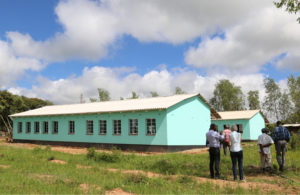 On her second visit to the school, community leaders made a formal presentation to Fran Fearnley, asking for assistance in raising funds in Canada for their new school. The community undertook to provide sweat equity by clearing land, digging trenches and toilet pits, and moulding some of the bricks.
On her second visit to the school, community leaders made a formal presentation to Fran Fearnley, asking for assistance in raising funds in Canada for their new school. The community undertook to provide sweat equity by clearing land, digging trenches and toilet pits, and moulding some of the bricks.
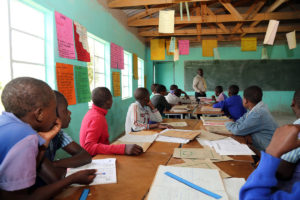 The first classroom block reached roof level in March 2012. Not having water on site was a complicating factor and cost in the construction, so generous donors again stepped in to fund a 40-metre drilled well and hand pump on the school site.
The first classroom block reached roof level in March 2012. Not having water on site was a complicating factor and cost in the construction, so generous donors again stepped in to fund a 40-metre drilled well and hand pump on the school site.
Construction continued as funds were raised. Fran continued to visit the site frequently on her visits to Zimbabwe. In 2014 the informal efforts of what was then known as ZimArt-in-Trust (supported by her business ZimArt) were formalized through the registration, in Ontario, of ZimKids Community Support. The hope had been to register a charity but both Foreign Affairs and the Canadian Embassy in Harare advised against it.
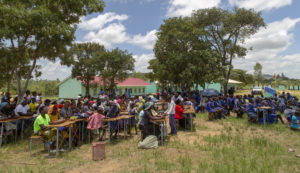 In September 2017 the Ministry of Education formally registered the school after all the following requirements had been met.
In September 2017 the Ministry of Education formally registered the school after all the following requirements had been met.
- Two classroom blocks (four classrooms) built
- Teachers’ house built
- A well drilled and hand pump installed
- Two toilets blocks (male and female) for students built
- Staff toilets built
- Handwashing system built
In addition ZimKids purchased and delivered school furniture. Four classes of senior grades moved into the facility and the Ministry appointed a Headmaster.
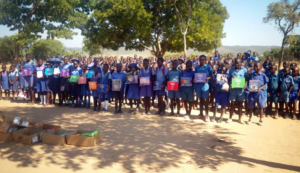 Following registration two storage areas were converted into mini libraries. Text books and reading books (based on the teachers’ selection) were purchased and delivered.
Following registration two storage areas were converted into mini libraries. Text books and reading books (based on the teachers’ selection) were purchased and delivered.
The younger grades were, however, still being educated in the old facility. The request from the community was that ZimKids would build one more classroom block in order to accommodate all the students in the community. The school agreed to a space sharing arrangement so that if another classroom block were built all students would be educated in the new facility through creative timetabling (eight grades in six classrooms).
The construction of the third classroom block was completed in September 2019 thanks to the generosity of a Canadian donor. Since that time all the children have been educated at the new site.
As is the case in many rural schools in Zimbabwe most families in Maori cannot afford to pay school fees. That means that there is no revenue stream to pay any “local” costs such as maintenance, security, sport programs, text books and extra-curricular activities.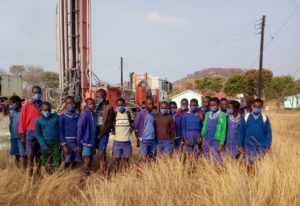
ZimKids has worked with Nyachuru Secondary School in nearby Howard Mission since 2006. This school has done an extraordinary job of utilizing land owned by the school to initiate agricultural projects which have not only sustained a year-round lunch program for students and staff but also generated income for the school to cover all local school costs.
ZimKids would very much like to assist the Maori community and school in starting a similar project. The main challenge has been insufficient water on site. Consequently, the focus in 2020 has been on raising funds to pay for the drilling of an additional well and installing a solar pump. This goal was accomplished in October 2020.
